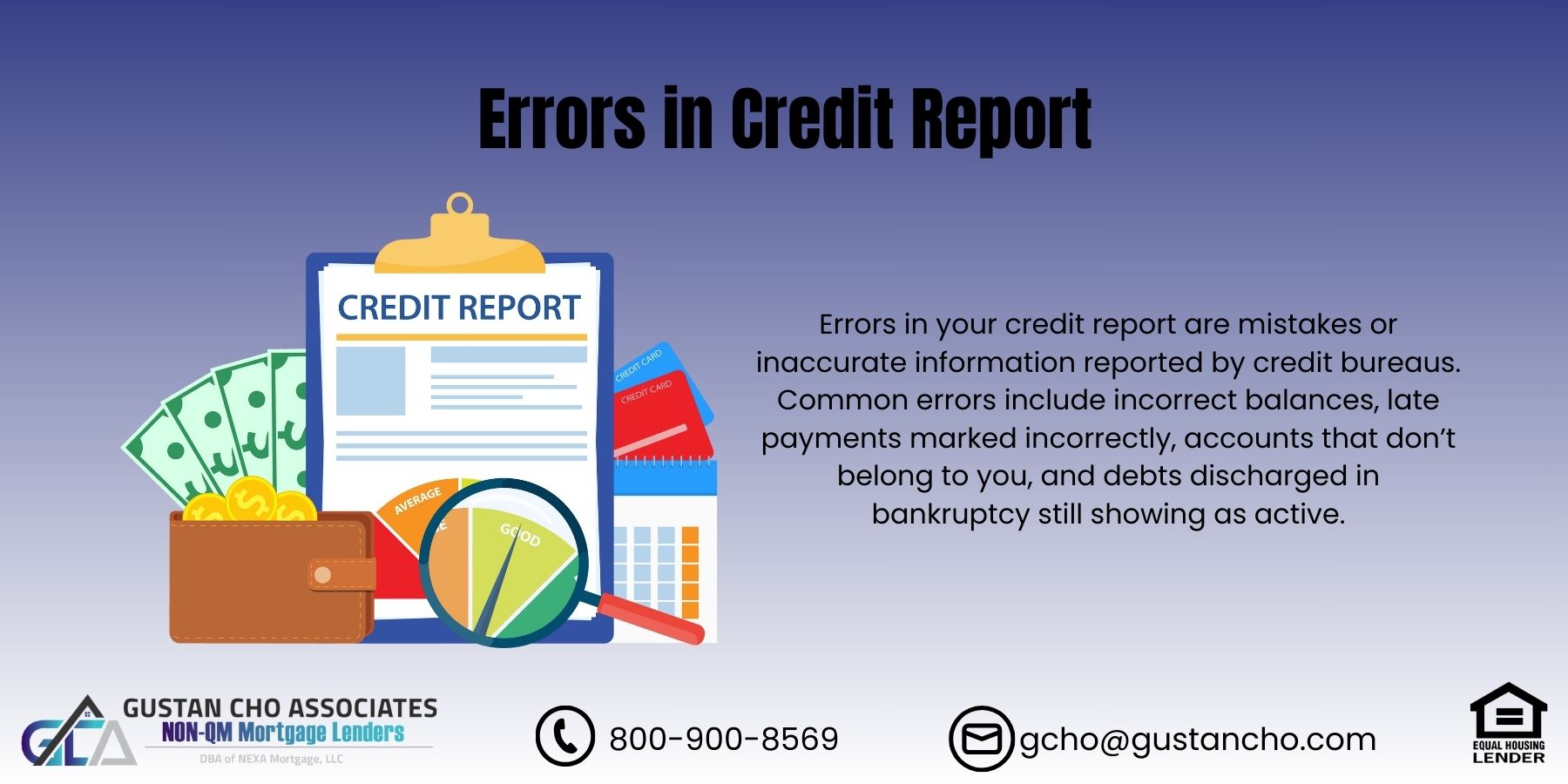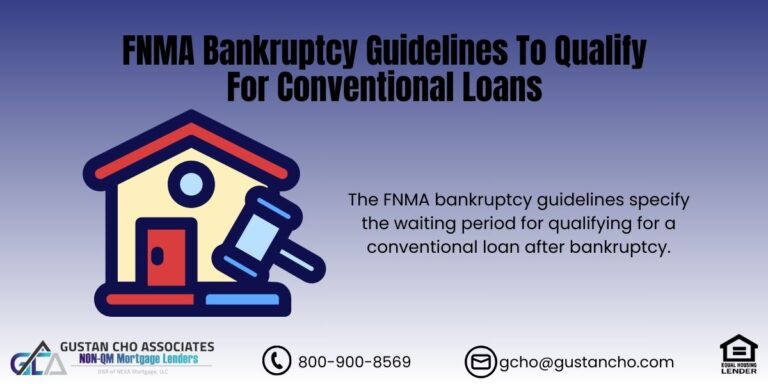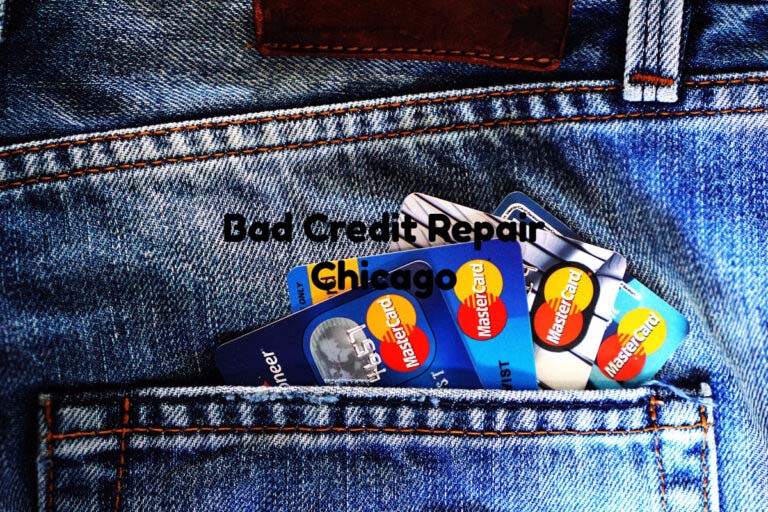Errors in Credit Report
Errors in your credit report can significantly affect your financial future, especially if you plan to buy a house or refinance your mortgage. No matter how small, a mistake in your credit report could lower your credit score. This might cause higher interest rates, loan denials, or delays in your mortgage application.
According to the Federal Trade Commission, one in four Americans have mistakes in their credit reports that could affect their ability to get a loan.
If you’re like most people, you don’t review your credit report often. But in 2024, staying on top of it is more important than ever. With the increased use of technology in the lending world and more consumers applying for mortgages, errors in credit reports are still a common issue.
In this guide, we’ll break down everything you need to know about errors in your credit report, how they can affect your mortgage, and how to correct them quickly—so you can be on your way to purchasing or refinancing your home with confidence.
What Are Errors in Credit Report?
Errors in credit report happens when the credit bureaus report inaccurate information. This can include:
- Incorrect balances
- Payments marked as late when they were actually paid on time
- Accounts that don’t belong to you
- Debts discharged in bankruptcy that are still reported as active
- Wrong personal information like your name or address
Errors in credit reports create the impression that you pose a higher credit risk than you do, which could reduce your credit score and cause lenders to be reluctant to approve your loan. Speak With Our Loan Officer for Mortgage Loans With Low Credit Scores
Why Do Errors in Credit Report Happen?
There are several reasons why errors appear on credit reports:
- Mistakes by Creditors – Lenders may report incorrect information to the credit bureaus by mistake. For example, they could list a payment late even if you paid on time.
- Identity Theft – If someone else uses your personal information to open accounts, those fraudulent accounts could appear on your credit report.
- Mismatched Information – The credit bureaus might confuse your information with someone else’s due to similar names or Social Security numbers.
- Bankruptcy Discrepancies – If you’ve filed for bankruptcy, debts included in the discharge should be noted as such, but credit bureaus sometimes fail to update this information.
How Do Errors in Credit Report Affect Your Mortgage?

One of the biggest times credit report errors can hurt you is when you’reapplying for a mortgage. Lenders use your credit report to decide if you can get a loan and what interest rate you’ll have. Here’s how an error could affect your mortgage:
- Lower Credit Scores – Even one inaccurate late payment can cause your score to drop significantly. This could push you into a higher interest rate bracket or lead to your loan application being denied.
- Higher Interest Rates – If your credit score drops due to an error, you could end up paying more in interest over the life of your mortgage, which could cost you thousands of dollars.
- Loan Denials – Major errors, such as a debt being reported that you’ve already paid or an account that’s not yours, could cause lenders to see you as too risky. This might result in a loan denial.
2024 Update: Stricter Credit Requirements in the Mortgage Market
In 2024, lenders are tightening their credit requirements for mortgages, making it even more crucial to have a clean credit report. Errors in your credit report could cost you the dream home you’ve been saving for. To avoid delays, higher rates, or denials, ensure your credit report is error-free before you apply.
How to Check Errors in Credit Report
You are entitled to a free credit report once a year from each of the three major credit reporting agencies—TransUnion, Experian, and Equifax. Reviewing all three reports is a good idea because they can each have different information.
To check your credit report for errors, follow these steps:
- Order Your Credit Reports – Visit AnnualCreditReport.com to get your free credit reports. In 2024, you can access your credit reports for free weekly, a great opportunity to monitor any changes.
- Review All Information – Carefully check each section of your report, including your personal information, account details, and payment history. Be sure to review for errors like inaccurate account balances, delayed payments that you are certain were submitted on schedule, or accounts that are not yours.
- Make a List of Errors – Write down any errors you find, including the account name, the specific error, and the correct information.
Get Qualify For Mortgage Loans With Low Credit Scores
How to Fix Errors in Credit Report
Fixing inaccuracies in your credit report may require some time, but it is crucial to ensure that your credit is represented correctly. Here are the steps you can take:
- Gather Documentation – If you spot an error, you’ll need proof to support your claim. This could be bank statements, payment confirmations, or letters from your creditors. For example, you’ll need your bankruptcy paperwork if a debt was discharged in bankruptcy but is still showing as active.
- Dispute the Error – You can dispute errors directly with the credit bureaus by submitting your information online, by mail, or over the phone. The credit bureaus must look into your claim within 30 days of getting it. If they find the information incorrect, they need to correct it. However, this process might take up to 45 days or even longer.
- Work With Your Lender – If you encounter an error while going through the mortgage process, get in touch with your loan officer. Certain loan officers can speed up the process by using a rapid rescore. Rapid can rectify inaccuracies on your credit report in 3 to 5 business days, enabling you to address the problem and proceed with your mortgage application promptly.
How a Rapid Rescore Can Help in the Mortgage Process
A rapid rescore is a service many mortgage lenders provide to help correct credit report errors quickly. If you’re in the middle of the mortgage process and find an error on your credit report, your loan officer can request a rapid rescore. Here’s how it works:
- Submit Documentation—You must provide documentation showing that the information on your credit report is incorrect (like proof of a paid-off account or updated balances).
- Get an Updated Credit Score—Once you submit the correct information, the credit bureaus will update your report, and your new credit score will be available within 3 to 5 business days.
Follow this efficient procedure to prevent any delays or denials in your mortgage approval due to errors on your credit report.
Rebuilding Your Credit After Bankruptcy
It’s important to rebuild your credit after bankruptcy, especially if you plan to buy a home in the future. Any mistakes in your credit report after bankruptcy can make this process even more challenging.
Typical Mistakes Following Bankruptcy:
- Incorrect Reporting of Discharged Debts – All debts included in your bankruptcy should be marked as discharged. If they’re not, it can look like you still owe the debt, which can hurt your credit score.
- Late Payments Post-Bankruptcy – Lenders may automatically disqualify you if any late payments are reported after your bankruptcy. Ensure that your credit report accurately reflects your bankruptcy and that no new late payments appear after the discharge date.
Tips to Rebuild Credit After Bankruptcy:
- Get a Secured Credit Card—Secured credit cards can help you repair your credit by enabling you to make small purchases and settle them in full every month.
- Keep Balances Low—Remember to aim for credit utilization that stays below 30% of your total available credit limit.
- Make Payments on Time—Always pay your bills on time, as your payment history has the greatest impact on your credit score.
The Importance of Checking Your Credit Report Regularly
Monitoring your credit report is key to catching errors early. In 2024, consumers have more tools and resources to monitor their credit and correct errors before they cause serious problems. Here are a few reasons why you should make this a habit:
- Prevent Identity Theft – Monitoring your credit report regularly can enable you to detect indications of identity theft at an early stage, such as unfamiliar accounts or inquiries.
- Monitor for Inaccuracies – Even if you aren’t planning to apply for a mortgage immediately, it’s a good idea to ensure your credit report is accurate.
- Stay on Top of Credit Score Changes – The amount of debt you’re carrying, changes in your payment history, or errors in your report can cause your credit score to vary.
How to Reach a Human at the Credit Bureaus (2024 Update)
In 2024, it’s still notoriously difficult to get through to a human representative at the credit bureaus. Automated systems are often slow, and wait times can be frustrating. However, reaching a representative is necessary when disputing an error.
Here’s a quick tip to save time: Use Shortcut Numbers Instead of waiting on hold for hours, use specific shortcut methods to get through to Experian, TransUnion, or Equifax. These methods help you reach a live person faster and save valuable time when correcting an error.
Final Thoughts: Don’t Let Errors in Credit Report Hold You Back
Inaccurate information on your credit report can affect your credit score and financial future. Whether you’re buying your first home, refinancing, or simply improving your financial health, correcting errors is a crucial step.
2024 is the year to take control of your credit report and ensure it reflects your financial health’s true story. Stay proactive by regularly checking your credit, disputing errors, and working with your mortgage lender to ensure that credit report errors don’t hinder your goals.
If you’re ready to purchase or refinance and want help reviewing your credit report for errors, contact our team at Non-QM Mortgage Lenders. We’re here to guide you through the process and help you confidently get into your dream home. Reach out today! Speak With Our Loan Officer for Mortgage Loans
Frequently Asked Questions About Errors in Credit Report:
Q: What are Errors in Credit Report?
A: Errors in your credit report are mistakes or inaccurate information reported by credit bureaus. Common errors include incorrect balances, late payments marked incorrectly, accounts that don’t belong to you, and debts discharged in bankruptcy still showing as active.
Q: How Do Errors in Credit Report Happen?
A: Errors happen for several reasons, including mistakes by creditors, identity theft, mismatched personal information (like a similar name or Social Security number), or reporting issues after bankruptcy.
Q: How Can Errors in Credit Report Affect My Mortgage Application?
Q: Errors in credit report can lower your credit score, which may result in higher interest rates, loan denials, or delays in your mortgage approval. Even a single error, like an incorrectly reported late payment, can cause significant issues.
Q: How do I Check for Errors in My Credit Report?
A: You can request a free credit report from each of the three major credit bureaus once a year and review all sections for accuracy. In 2024, you can access your reports weekly for free through AnnualCreditReport.com.
Q: What Should I do if I Find Errors in My Credit Report?
A: The first step is collecting evidence supporting the error, like bank statements or payment receipts. After that, submit a dispute to the credit bureau that provided the incorrect information. They must investigate within 30 days, but the process may extend to 45 days.
Q: Can I Fix Errors in My Credit Report During the Mortgage Process?
A: Certainly, if you encounter errors in your credit report while applying for a mortgage, your loan officer can help you utilize a rapid rescore. This method can promptly revise your credit report within 3 to 5 business days, enabling you to proceed with your loan application without encountering holdups.
Q: How Does a Rapid Rescore Work?
A: A rapid rescore is a service provided by some mortgage lenders that allows you to correct errors on your credit report quickly. You must provide documentation showing the correct information, and your lender will request the rescore. The updated credit score should be available within a few days.
Q: Why Should I Check My Credit Report Regularly?
A: Regularly checking your credit report helps you catch errors early, prevent identity theft, and monitor changes in your credit score. It’s especially important if you plan to apply for a mortgage soon, as fixing errors can take time.
Q: How do I Reach a Human at the Credit Bureaus to Dispute an Error?
A: It can be challenging to reach a real person at the credit bureaus, but using shortcut numbers or specific menu options can help. For example, pressing “0” repeatedly or using certain menu choices can connect you to a live representative more quickly.
Q: What Should I do if My Credit Report Doesn’t Reflect a Bankruptcy Discharge?
A: If a debt in your bankruptcy isn’t showing as discharged, it can hurt your credit score. Gather your bankruptcy paperwork and dispute the error with the credit bureaus. You may also want to consult your bankruptcy attorney or loan officer to correct this issue.
If you have any questions about Errors in Credit Report, please call or text us at 800-900-8569. Or email us at gcho@gustancho.com. The team at Non-QM Mortgage Lenders is available 7 days a week, on evenings, weekends, and holidays. Speak With Our Loan Officer for Mortgage Loans
This blog about “Errors In Credit Report” was updated on September 16th, 2024.







